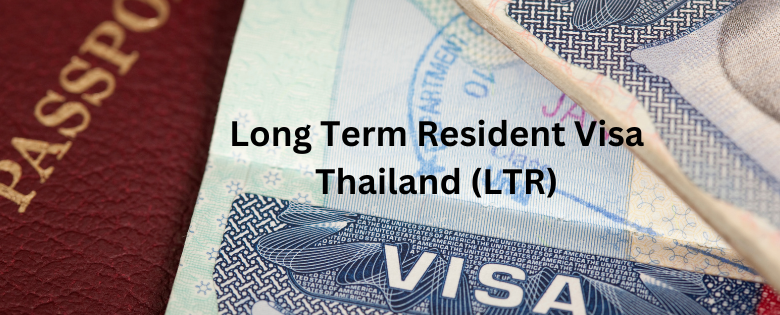Everything You Need to Know About Long-Term Visas for Thailand

Thailand, known for its stunning beaches, rich culture, and vibrant cities, has become a popular destination for both tourists and expatriates seeking a change of lifestyle. Whether you’re planning to stay for a few months or even several years, a long term visa Thailand might be the right solution. This visa category is designed for individuals who wish to stay in the country for an extended period, whether for work, study, retirement, or other personal reasons. In this comprehensive guide, we will explore everything you need to know about securing a long-term visa for Thailand, from eligibility to the application process.
Types of Long-Term Visas for Thailand
Thailand offers several types of long-term visas, each catering to different needs and purposes. These visas typically last for six months to one year, and in some cases, they may be extended for additional periods.
1. Tourist Visa (Multiple Entries)
A multiple-entry tourist visa allows you to stay in Thailand for an extended period, typically up to six months, with each entry allowing you to stay for 60 days. After 60 days, you can apply for an extension of 30 days at the Thai immigration office. This type of visa is ideal for tourists who plan to travel in and out of Thailand over the course of a year.
Eligibility:
- Proof of sufficient funds (around 200,000 THB or equivalent in other currencies)
- Valid passport for at least six months
- Completed visa application form
2. Non-Immigrant Visa (Business, Education, and Employment)
The non-immigrant visa category covers various types of long-term stays, including business, education, and employment. It allows you to stay in Thailand for one year with the possibility of extending it. There are subcategories within the non-immigrant visa depending on the purpose of your stay:
- Non-Immigrant B (Business): For those who wish to work or invest in Thailand.
- Non-Immigrant ED (Education): For students attending Thai schools, universities, or language programs.
- Non-Immigrant O (Other): For those seeking long-term stays for reasons like volunteering, family visits, or personal affairs.
Eligibility:
- For business visas, proof of employment or business operations in Thailand is required.
- For education visas, proof of enrollment in a Thai educational institution is necessary.
- The non-immigrant O visa requires documents proving family ties (spouse, children, or elderly parents), or other valid reasons for staying in the country.
3. Retirement Visa (Non-Immigrant O-A)
The retirement visa is an ideal option for individuals who are 50 years or older and wish to live in Thailand for the long term. This visa allows retirees to stay in the country for one year, with the option to renew it annually. The retirement visa is specifically designed for those who want to live comfortably in Thailand without working.
Eligibility:
- Must be at least 50 years old.
- Proof of income of at least 65,000 THB per month or a bank deposit of at least 800,000 THB in a Thai bank account.
- Health insurance covering medical expenses in Thailand.
- No criminal record.
4. Thai Elite Visa
The Thailand Elite Visa is a premium long-term visa that offers a range of benefits and privileges to high-net-worth individuals and those seeking a luxury lifestyle in Thailand. The Thailand Elite Visa comes in several packages, with the most common being the Elite Easy Access visa, which allows a stay of up to five years. There are other options for longer-term stays, such as the Elite Ultimate Privilege visa, which offers a 20-year stay.
Eligibility:
- Significant financial assets and a background check.
- Various packages are available, each with different fees and benefits.
Benefits:
- Fast-track entry and exit from Thailand.
- VIP airport services.
- Access to exclusive events, golf courses, and luxury concierge services.
5. Marriage Visa (Non-Immigrant O)
A Marriage Visa allows foreign nationals who are married to a Thai citizen to live in Thailand for a long period. The visa can be renewed annually as long as the marriage is valid. This visa offers the same benefits as the retirement visa but is suitable for those in a committed relationship with a Thai national.
Eligibility:
- Proof of a legal marriage to a Thai citizen.
- Proof of financial stability (similar to the retirement visa requirements).
How to Apply for a Long-Term Visa for Thailand
The process of applying for a long-term visa for Thailand varies depending on the type of visa you are applying for. However, the general steps are as follows:
1. Prepare Your Documents
Before you apply for a long-term visa, make sure you have the following documents:
- A valid passport with at least six months of validity.
- Passport-sized photos (2 inches x 2 inches).
- Proof of financial stability (bank statements, income statements, etc.).
- Proof of your purpose for staying in Thailand (e.g., employment letter, admission letter from a Thai school, marriage certificate, etc.).
- Visa application form (available at Thai embassies or consulates).
2. Submit Your Application
Submit your application to the Royal Thai Embassy or Consulate in your home country or country of residence. Ensure that all required documents are included with your application. For certain types of long-term visas, additional documentation may be required.
3. Wait for Approval
Visa processing times may vary, but it generally takes 5 to 10 business days for a standard long-term visa. Some visa types may require additional processing time, especially for the retirement or Thai Elite visa.
4. Receive Your Visa
Once approved, you will receive your long-term visa. Make sure to double-check the details and the duration of your stay before traveling to Thailand.
Extension and Renewal of Long-Term Visas
Many long-term visas for Thailand are valid for one year, and they can often be extended or renewed. For example:
- Tourist visas: Can be extended up to 90 days at a local immigration office.
- Non-immigrant visas: Can be extended, but the requirements for extensions will vary depending on the visa type. For instance, a work visa extension will require continued employment in Thailand, while a student visa extension will require proof of ongoing enrollment in a Thai educational institution.
- Retirement visas: Can be renewed annually, provided the applicant continues to meet the financial and health insurance requirements.
Tips for a Smooth Long-Term Stay in Thailand
- Stay on Top of Immigration Rules: Thailand’s immigration laws can change frequently, so always keep up-to-date on visa requirements and deadlines.
- Maintain Financial Requirements: Make sure you continue to meet the financial criteria for your visa, such as maintaining a minimum bank balance or showing proof of income.
- Follow the Rules: Be mindful of Thai laws and regulations, including those related to visa overstays. Overstaying your visa can result in fines or deportation.
- Health Insurance: Make sure you have valid health insurance that meets Thai requirements, particularly for retirement and marriage visas.
- Seek Professional Advice: If you are unsure about the visa process or requirements, consider consulting with a Thai immigration lawyer or visa agency to help navigate the application and renewal processes.
Conclusion
A long-term visa for Thailand offers many opportunities for those seeking to live, work, study, or retire in one of the most beautiful countries in Southeast Asia. With options ranging from retirement visas to business visas and the exclusive Thailand Elite Visa, there is a long-term visa option to suit various needs. By understanding the eligibility criteria, application process, and renewal options, you can plan your stay in Thailand with confidence and ease. Whether you’re dreaming of a tropical lifestyle or pursuing professional opportunities, Thailand offers an inviting environment for long-term residents.









